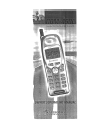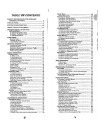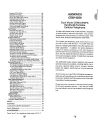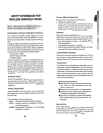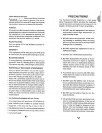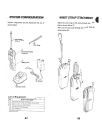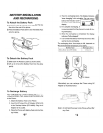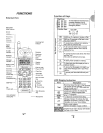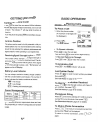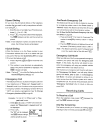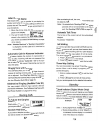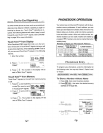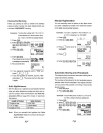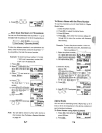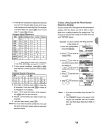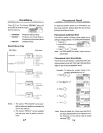
Other Medical Devices
If you use any other personal medical device, consult the
manufacturer of your device to determine if they are ad-
equately shielded from external RF energy. Your physician
may be able to assist you in obtaining this information.
Your Handheld Portable Telephone is a high quality
piece of equipment. Before operating the equipment,
read all instructions and cautionary markings on ( 1) AC
Adapter, (2) Battery and (3) Product using Battery.
Vehicles
RF signals may affect improperly installed or inadequately
shielded electronic systems in motor vehicles. Check with
the manufacturer or its representative regarding your
vehicle. You should also consult the manufacturer of any
equipment that has been added to your vehicle.
1. DO NOT use this equipment in an extreme
environment where high temperature or
high humidity exists.
2. DO NOT abuse the equipment. Avoid strik-
ing, shaking or shocking. When not using
the unit, lay down the unit to avoid possible
damage due to instability.
Posted Facilities
Turn your phone OFF in any facility where posted no-
tices so require.
3. DO NOT expose this equipment to rain or
spilled beverages.
AIRCRAFT
FCC regulations prohibit using your phone while in the
air. Switch OFF your phone before boarding an aircraft.
4. DO NOT use unauthorized accessories.
5. DO NOT disassemble the phone or its .ac-
cessories;lf service or repair is required,
return the unit to an authorized Audiovox
cellular service center. If the unit is disas-
sembled, the risk of electric shock or fire
may result.
BLASTING AREAS
To avoid interfering with blasting operations, turn your
phone OFF when in a "Blasting area" or in areas posted
"Turn off two-way radio". Obey all signs and instructions.
6. To prevent injury or burns, DO NOT allow
metal objects to contact or short circuit the
battery terminals.
POTENTIALLY EXPLOSIVE ATMOSPHERES
Turn your phone OFF when in any area with a poten-
tially explosive atmosphere and obey all signs and in-
structions. Sparks in such areas could cause an explo-
sion or fire resulting in bodily injury or even death.
Areas with a potentially explosive atmosphere are of-
ten but not always clearly marked. They include fueling
areas such as gasoline stations, below deck on boats,
fuel or chemical transfer or storage vehicles using liq-
uefied petroleum gas (such as propane or butane), ar-
eas where the air contains chemicals or particles, such
as: grain, dust, or metal powders, and any other area
where you would normally be advised to turn off your
vehicle engine.
7. DO NOT open the battery case. If the bat-
tery is accidentally broken, avoid skin con-
tact with the internal chemical contents. If
there is skin contact, wash the affected area
immediately and seek medical advice.
8. DO NOT put the battery close to, nor dis-
pose it into fire.
9. The product that you have purchased con-
tains a rechargeable Battery. At the end of
its useful life, under various state and local
laws, it may be illegal to dispose of this
Battery into the municipal waste stream.
Check with your local solid waste officials
for proper disposal procedures in your area.
For Vehicles Equipped with an Air Bag
An air bag inflates with great force. DO NOT place ob-
jects, including both installed or portable wireless
equipment, in the area over the air bag or in the air
bag deployment area. If in-vehicle wireless equipment
is improperly installed and the air bag inflates, serious
injury could result.
"8
9~



